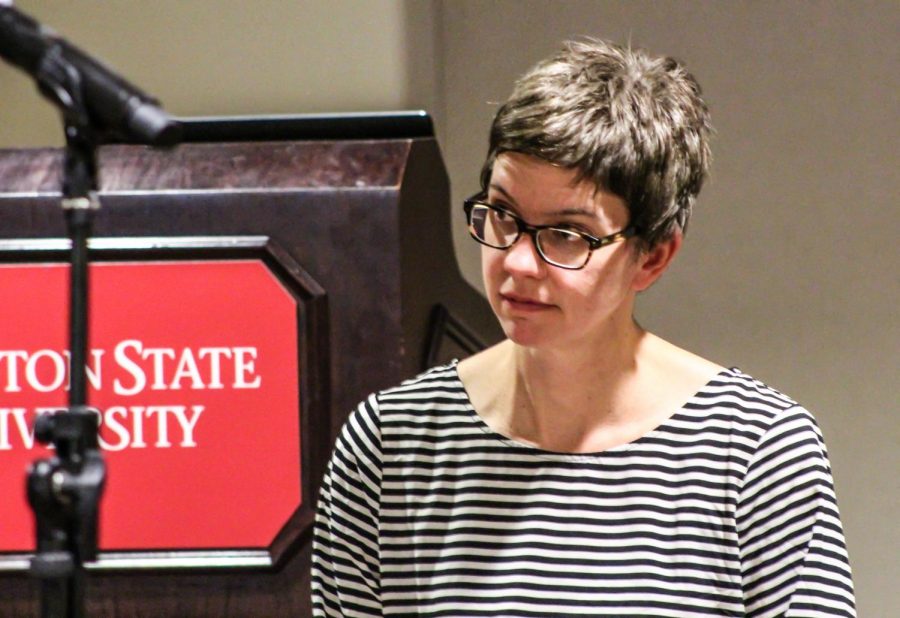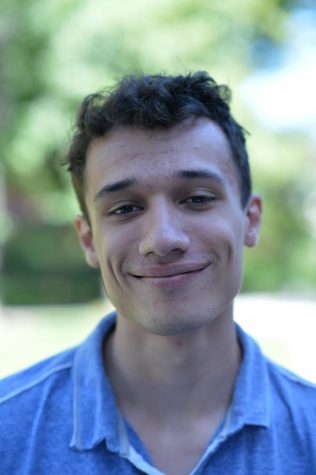- Administration
- Faculty
- Local
- News
- Politics
- Research
- TOP FEATURES
- WSU Everett
- WSU Pullman campus
- WSU Spokane
- WSU Tri-Cities
- WSU Vancouver
Second provost candidate presents to university community
Candidate has been at University of Minnesota 20 years; says they want to establish relationships and network if selected
Julie Kmec, co-chair of the Provost search committee, discusses how the search guidelines for a new provost are constantly being adapted to fit the needs of the university on Monday evening in the CUB Junior Ballroom.
April 15, 2020
The second presentation during WSU’s provost search featured a variety of color-coordinated maps from a geography professor seeking to become the university’s next provost.
“As a geographer I felt I had to throw in at least one or two maps in,” provost candidate Robert McMaster said.
McMaster is the current vice provost and dean of Undergraduate Education at the University of Minnesota Twin Cities. He presented his goals for a provost at a land grant university such as WSU and answered questions during an online Zoom session on Tuesday.
“Land grant universities are very important,” he said. “Nearly every state has one.”
Although land grant universities were established in 1862 to focus on teaching agriculture, science and military science, he said the missions between them and other major universities have narrowed to become more similar over time.
During his presentation, McMaster focused on strategic enrollment, supporting faculty and decreasing student loan debt.
“We can see the cost of education and student debt [as a challenge for a public university],” McMaster said. “It’s been labeled a national crisis.”
The average student loan debt in Minnesota is among the top 10 highest in the nation at $31, 734, according to a 2018 report from the Institute of College Access and Success. At McMaster’s university, the average student loan debt is $26,568.
“We’re a bit lower … because of some solid financial aid resources we can put on the table,” McMaster said.
The average student loan debt in Washington is $23,936, ranking in the top 10 in the nation for lowering the cost of education.
Co-chairs of the provost search committee Stacy Pearson and Julie Kmec attended the presentation to directly ask McMaster questions submitted from community members.
One question he answered regarded getting undergraduate students involved with research. To do this at UM, he said the university pushed out the traditional, STEM-focused model of research to incorporate all areas of academia.
“When I say research, I don’t mean going into a laboratory and working with test tubes and Brunson burners, although that’s certainly part of it,” McMaster said.
Internships and student employment are also two areas he’s heavily focused on at UM as they offer additional layers of student engagement and success, he said.
McMaster has been in Minnesota for 30 years, he said. Because of this, the biggest challenge of being provost at WSU would be building relationships and networks for him.
“The first part of the job and the big challenge would be to as quickly as possible establish relationships and networks,” McMaster said. “Provost has to know it all.”
Another question from a faculty member asked McMasters what he’s done to increase diversity and equity at his university.
He said as the department chair of geography, he established a diversity committee. While not having immediate results, McMaster said department faculty became more diverse after his tenure as chair.
“The role of the provost here is essential,” he said.
As vice provost, McMaster said he developed the President’s Emerging Scholars program. The program brings in 500 multicultural and low-income students each year to UM. Those students are provided supports such as scholarships and peer mentors, he said.
“We’ve seen terrific progress in terms of retention and graduation rates of our multicultural students,” he said.
The next candidate, Montana State University Vice Provost Tami Eitle, will present 1-2 p.m. on Wednesday.

















